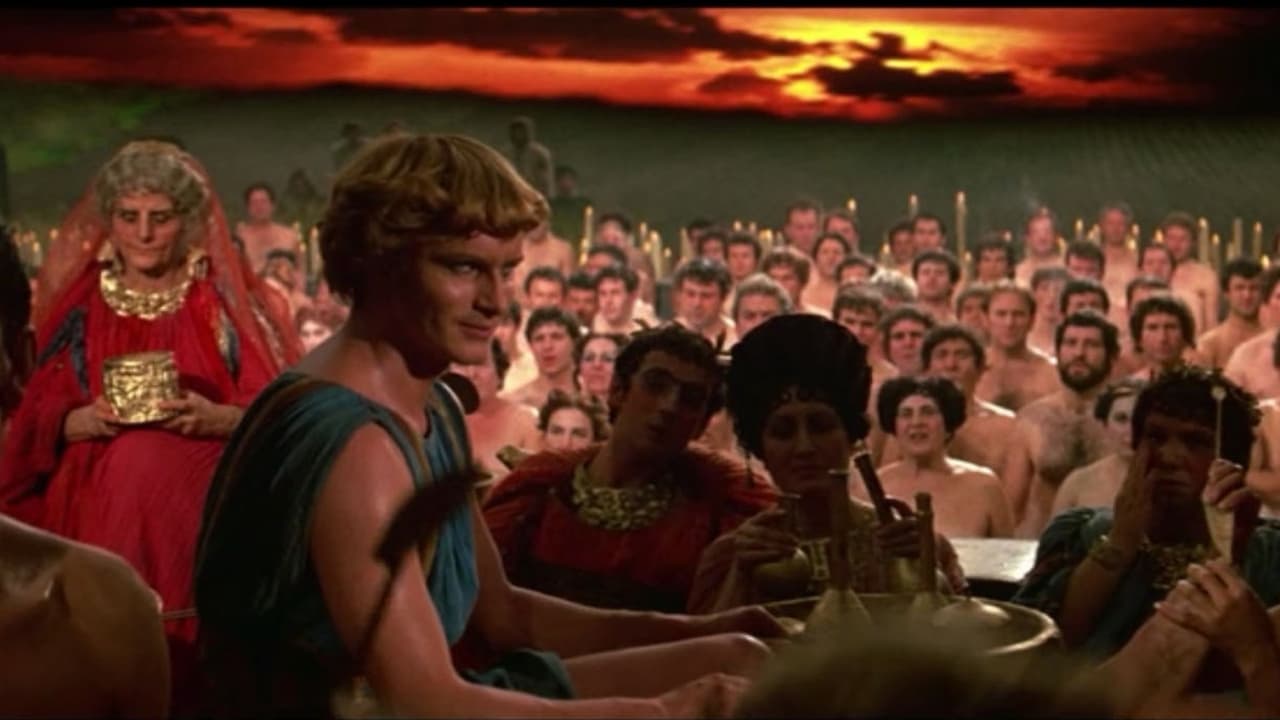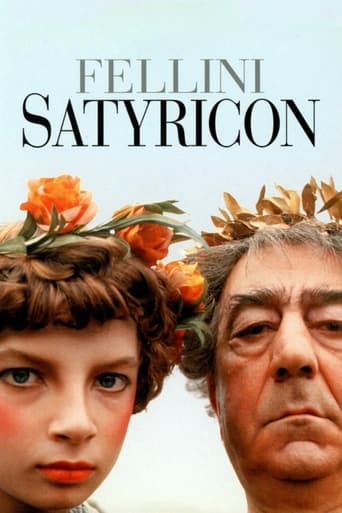

Very well executed
... View MoreStrictly average movie
... View MoreNot sure how, but this is easily one of the best movies all summer. Multiple levels of funny, never takes itself seriously, super colorful, and creative.
... View MoreA great movie, one of the best of this year. There was a bit of confusion at one point in the plot, but nothing serious.
... View MoreGood actors but the script based on Petronius' writings is ambitious but flawed. Petronius' own writings is partially lost. Fellini tries to connect the surviving tales and loses credibility while trying to connect the surviving fragments. The highlights: the short but evocative performance of Lucia Bose as a slave owner who frees her slaves and commits suicide with her husband who are facing bad days ahead, The others are Capucine and Magali Noel (a Fellini regular) who have a commanding screen presence in their brief roles.
... View MoreThis film is, in large part, homosexuality seen through a heterosexual male's lens. As a result, it fails at basic things. For instance, the blonde "protagonist" has a decent-looking male lover his age (who is regrettably unattractive in personality) but Fellini insists on having him desire a very homely-looking boy, one who also has an unappealing dully coquettish personality. Why? Obviously, this is to make a negative point about ancient Rome and homosexuality. "Ewww... how decadent, uncomfortable, and wrong it is!" That's apparently supposed to be the reaction. Fellini seems to conveniently exploit ignorance about homosexuality in his often drab little theatrical universe. The irony is probably that, given all of its varying settings and its "art is free!" mantra, the world itself is almost suffocatingly puny. There is a tremendous lack of vision in this film. I wonder if a man even needs to be gay to see how thin it is, just looking at the homosexuality angle. Even the superficially affirming scene with the minotaur may primarily be the sad "dominance" hypothesis reconstituted (where male homosexuality is not common at all in any animal species but is rather merely displays of dominance and submission - sexual aggression). Male lions, for instance, aren't allowed to enjoy sex according to humans. They simply must be aggressive rapists, or whatever.Fellini seems to enjoy the "freak show" - a carnival of second-rate wonders and horrors. A similar tack was taken with the Caligula film. "Oh, gee, those ancient Romans sure were gross, weren't they? Eww.. isn't homosexuality awful?" In that film it was even more pointed. The only homosexual sex act that occurred was between two very unattractive men in an extremely brief corridor scene, framed by Malcolm McDowell's ugly mug trying to look uglier than usual. Fisting is substituted for gay sex in that film in a totally brazen anti-gay schtick - where violence, pain, humiliation, and terribly subjugation are supposed to be the point of homosexual acts between men. Again, it's homosexuality through the prism of an ignorant heterosexual male point of view.While this film isn't as bad as that in some ways, as it's less simplistic in that regard, the casting of the pubescent boy is an obvious example of Fellini's refusal to present sex in a positive light. This can be seen in his film Cassanova very clearly, more so than in this film - which, at least, has two good-looking actors in it (despite their dishpan personalities). Cassanova has a scene where a stereotypically young gay man (hardly the apotheosis of gay male desire) appears, scantily clad, for a bit of dinner theater with a really ugly man. The grotesque and the camp seem to be the extent of Fellini's engagement with concepts of male homosexuality.I have read various opinions about what Fellini's point was... what themes he was trying to convey. Regardless, I can only say that nothing in this film was particularly thematically scintillating. The closest thing to interest was in the disconcerting nature of the radical setting/tone shifts, which, at least, distracted from the annoying "personalities" of the characters. If the idea was that the blonde couldn't find satisfaction then there is some coherence between the on-screen happenings to the character and the audience's frustration.The film felt like a demo rather than a finished production.
... View Moreit seems be a chess game between Petronius and Fellini. or a fight. or competition between two universes who become one. Satyricon is a portrait of Rome. in same measure, the portrait of contemporary society.because it is illustration of a simple recipes : black humor, sexual fantasies, trip in the different parts of an empire, Encolpius challenges and brutal truth, history and dream, images, meets, grotesque party and the status of viewer as witness to the universe under Nero who reminds work of Pasolini or Tarkovski or new Romanian cinema wave, each as looking of the truth. Fellini Satyricon has a gift to each category of public. and this is the basic virtue. in same measure, it is a reinvent of Rome and the testimony of a kind of Odiseus about people and society and desires and gluttony.a show. a fascinating one
... View MoreIt would be nice to think that the Ancient Romans were a lot like us. After all, America's founding fathers looked up to the stern fathers of the Republic far more than they ever did to any so called Judeo-Christian values. We have a "Senate House" on a Capital Hill, and our national bird is more than a little consciously modeled on the symbol of Imperial Rome. Indeed, Alexander Hamilton, when asked, declared that "the greatest man who ever lived was Julius Caesar." Heady stuff, no? Of course, the real thing was nothing like what we imagine it was. If by some miracle a time machine was invented, and we somehow found ourselves in the Forum some day in , oh, 44 BCE, say, we would be completely baffled by the people around us, their behavior, their language, their modes of dress, their beliefs about the afterlife, etc, etc. They would be, essentially, alien, in far more ways than they would resemble us. So here, in his usual fascinating, over-the-top way, Fellini gives us his own mishmash, hodge-podge version of Rome in the 1st century, scary, alien, bizarre, oddly comical, dehumanizing, and very erotic without being pornographic (Bob Guccione clearly misunderstood the whole point of Satyricon when he stole the "look" of the film for his "Caligula", which failed on so many levels that it isn't even able to pull off "cult" status). It "feels" so right about so many things, even when it veers off into fantastical territory. It brings the vibrant color and vicious thought processes of the pagan world into full focus, allowing us to see, perhaps, why the Christians were so vehement about not wanting anything to do with it, and also, just as likely, just how prudish those same people probably were (sure, poverty is awful, but if you really thought that you wouldn't spend so much more time talking about how sex is an even GREATER evil. . .don't ya think? Priorities, folks, priorities. . .)The story is not really the point. . .suffice it to say that there is a light thread throughout about the adventures of two students, both probably Greeks living in southern Italy, Encolpios and Ascyltos, and their mutual lust for a slave boy, Giton, who leaves Encolpios for Ascyltos, since he has more money. The story is fragmented, as is the surviving text of the original work by Petronius, but there is abduction, shipwreck, bizarre Gods and Godesses roaming about, wise men unable to deal with the damnable times, and several possible morals, or none at all, depending on your viewpoint. It is probably the most "on the money" depiction of the ancient world put to film. . .incoherent, beautiful, and very, very bizarre.
... View More